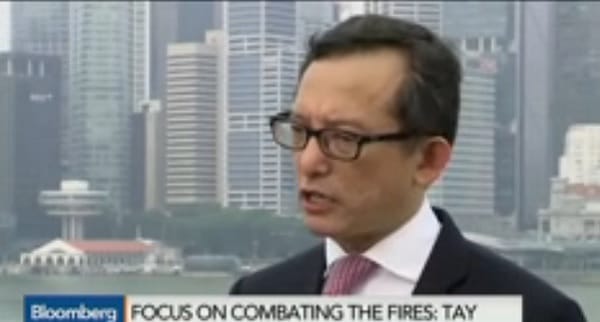Singapore Institute of International Affairs Chairman Simon Tay discusses the haze affecting parts of Southeast Asia, its cause and what’s being done about it. He speaks to Bloomberg’s Haslinda Amin on “First Up” on 16 September 2015.
Q. It’s not a new problem, it’s been going on for decades. What really is the issue, why can’t it be resolved?
A. These are from fires happening in Indonesia. Even though it’s been bad for the last week, it’s been bad for months in the ground in Indonesia. The provinces (are) near Singapore, it doesn’t get to Jakarta, the capital of Indonesia. Things have been burning for days, for months and for many years. And this is deliberate. This is really for palm oil, there are some other plantation crops involved, and it’s meant to be the cheapest way to clear land as they expand this industry.
Q. There is a legislation in Singapore allowing it to punish those responsible. Can we find those people?
A. Well, the law was passed last year and it may be time to really start testing it in terms of first, investigating, finding out the information, getting the maps, but first and foremost, Haslinda, what is key is that this is illegal even under Indonesian law. Indonesia is now starting to mobilise on the issue, but it should have acted earlier. They’re investigating some 15 companies, the minister has not named them yet, but we’ve heard reports from Jakarta from my team there that they are going to name them quite soon, hopefully. And really this is where it has to start. It has to be the Indonesian companies or Singapore investors in Indonesia facing Indonesian law.
Q. But having said that, Simon, it’s been decades. Why only now. Why has it been so difficult. And until now Indonesia has not shared the names of those companies.
A. Well, first of all it is nationalism. There is a sense in Indonesia, of some Indonesians, that this is other people’s problems. So you have the Vice President and other people saying, we give the whole region, Singapore, Malaysia, eleven months of clean air, why do they complain about one. And that’s a wrong attitude because the first people suffering are ten thousand people in the Riau province, the ten thousand people there who’ve gone to see their doctors or are in hospital. Here in Singapore we are relatively alright, this is mild. It’s over 600 PSI in Riau yesterday. And we can go to hospital. We’ve just announced in Singapore a scheme to help the poor, the young, the elderly go to doctors very cheap to take care of this short term emergency. But for the prolonged problem in Indonesia, it’s going to be Indonesia who solves it.
Note: Since this interview was broadcast, some names of firms under investigation by Indonesian authorities have emerged.
Q. To be sure, it’s not just Indonesian companies. Indonesia has made it crystal clear that Singaporean, even Malaysian companies are responsible.
A. That’s true. The economies are interdependent, the environment is interdependent. So Singapore is willing to do its part. I think it is time for us to test our laws. If there is a Singapore company that is involved in this, Indonesia should name it, help us get the official maps, and I would ask our government to prosecute that company, this year, now.
Q. Quantify the cost of the haze that we go through every single year.
A. Well, there are advantages, some companies really make a lot of money out of this by clearing land cheaply, and palm oil and other things right now are cheap, so they’ve got to lower their costs. So there are people making money. For the rest of us, tourism, health, it adds up to maybe $5 billion in 1997, 1998, when it was much worse, much more prolonged. This year, we have not done an estimate, but the costs, if added up – the health costs, etcetra – could be in that region.
Q. Let’s talk about the AEC, the ASEAN Economic Community. How can we talk about an AEC without solving this problem first.
A. I think clearly ASEAN has been moving on this. There is actually an ASEAN haze treaty, which Indonesia has finally ratified, just last year. Indonesia had for many years refused to get into this treaty and start moving on their ground. So I think that this is where the problem is. The AEC, the environment, ASEAN as a group, if one big member does not see it’s in their interests and their reputation to do something that is good, it won’t work. Singapore, Brunei, Malaysia are going to ask Indonesia to act, but in the end it has to be cooperation.
Q. Is it realistic to expect something will be achieved this time around? Will it be any different?
A. Well, you could say no, if you want to be sceptical about it. We’re already in the middle of it, it would take two to three weeks to even put out the fires. Once these fires start, the scale and the kind of land they’re on makes it very hard to stop. Indonesia has to its credit put over 2000 military personnel into firefighting mode and sent them off across to the affected provinces. This is a lot but too late. The information doesn’t seem to have gone up from the provincial officials to the ministry and to the president. So Pak Jokowi has promised action, he’s called an emergency, but right now this is where we are.




